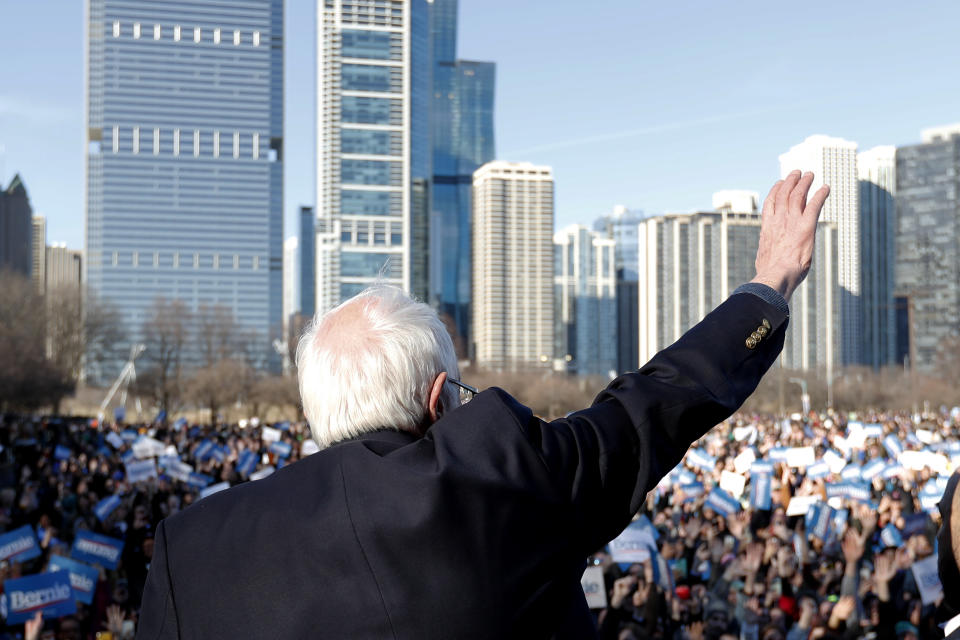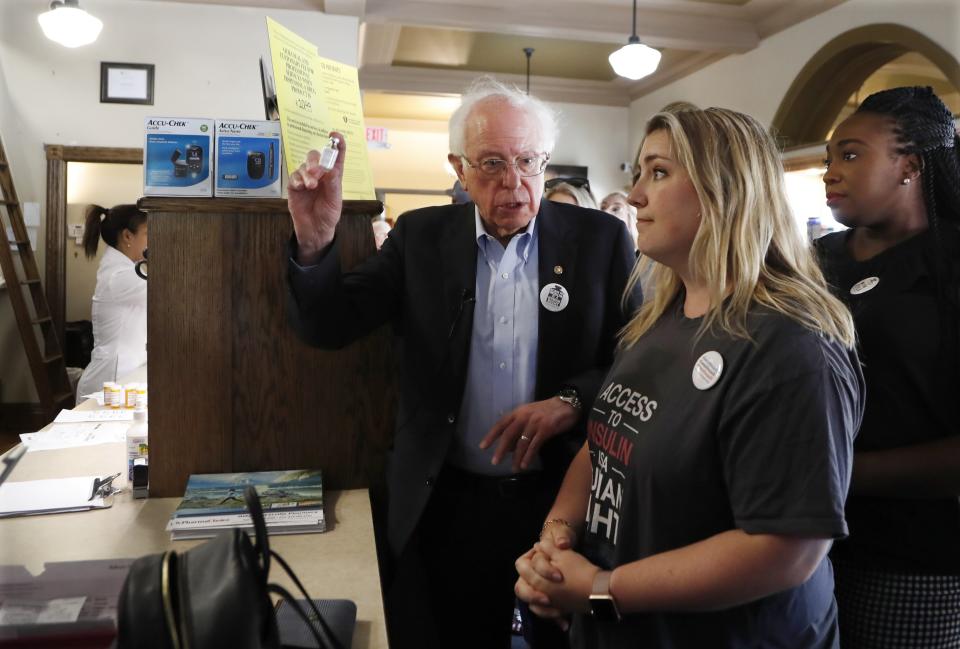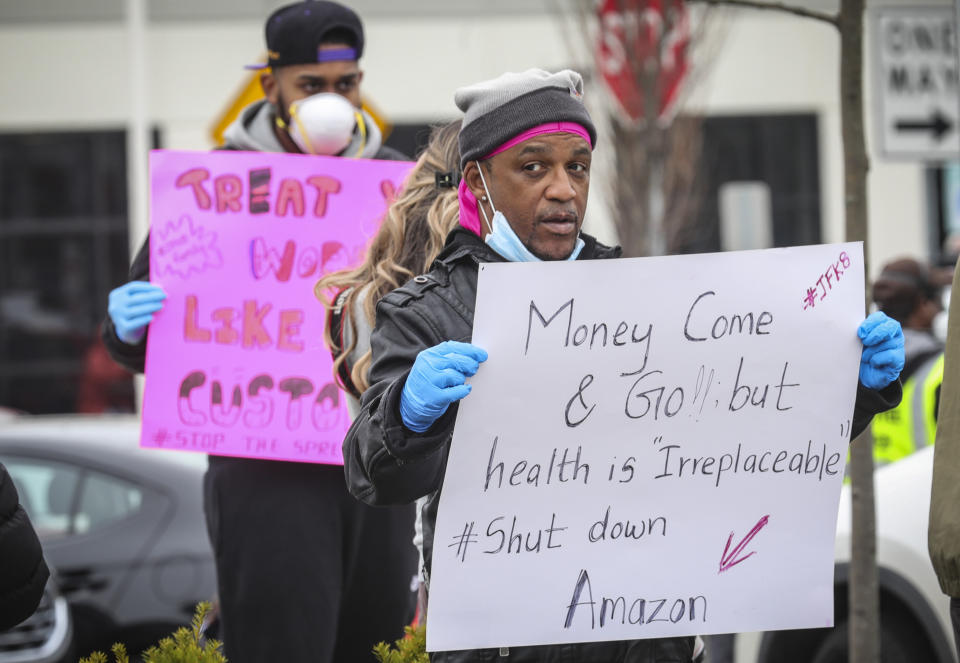Will We Ever Live In Bernie Sanders’ America?

It’s worth pausing and considering what Sen. Bernie Sanders envisioned for America in its totality.
Every single American’s health insurance would be sponsored by the government, and companies like Cigna or Blue Cross Blue Shield would essentially be cut out of the health care business. Prescription costs would be limited to $200 a year.
Having a baby would come with six months of paid parental leave, guaranteed. Public day care, public preschool and public colleges and universities would all be tuition-free. Every public school teacher would make at least $60,000 a year. Student debt would be gone. So would medical debt. Credit reports wouldn’t cost a penny, the government would just do it for you. The post office could be your bank.
The minimum wage would be $15 an hour. Your boss couldn’t just fire you for no reason because “at-will” employment would be outlawed. Twenty percent of the country’s labor force would be in a union, and unions in the same industry could bargain together. Large companies would all come under partial employee ownership. Workers would control nearly half the seats on corporate boards.
By 2030, all new American cars on the market would be zero-emission. Electricity would come only from wind, solar or hydropower, and would be run by the government. The United States would invest $16 trillion to completely zero out planet-heating emissions by 2050.
Rent could only increase by 3% every year. Housing assistance would become an entitlement, guaranteed to all Americans. Marijuana would be legalized. Social Security checks would be $150 bigger each month.
Immigrants, documented or undocumented, would be allowed to benefit from any of these social services. Nearly 9 million residents would be made free of deportation fears. Crossing the border wouldn’t be a criminal offense. The country would be spending a lot less on the military. Prisoners would be able vote. The uberwealthy would pay a whole lot more in taxes. Wall Street would pay a whole lot more in taxes. Corporations would pay a whole lot more in taxes. And likely, so would individuals in order to support a sweep of social safety net programs that would radically change American life as we know it.

The Vermont senator dropped out of the presidential race Wednesday, ceding the Democratic nomination to former Vice President Joe Biden in the middle of a pandemic, having been off the campaign trail for nearly a month. It was this time of crisis when Sanders and his allies saw his agenda resonating most.
Suddenly, Democrats and Republicans were backing expansions to unemployment benefits and paid leave, and making coronavirus testing cost-free.
“COVID-19 is exposing all the gaps in our health care system,” said Alexandra Rojas, the executive director for Justice Democrats and a former Sanders staffer. “Incremental policies that kick the can down the road are not what will meet this moment.”
Marie Newman, a progressive Democratic candidate for Congress who successfully defeated one of the most conservative House Democrats in March, said she thinks “Medicare for All” is going to be “much more likely to happen as a result of having the tragedy of the pandemic on our hands.”
Some politicians seemed to discover the benefits of a strong social safety net and aggressive government action only as the country scrambled to deal with the coronavirus outbreak and saw the economy shut down. Sanders has been decrying the immorality of the gaps in the American safety net for a lifetime. His presidential campaign was about families in crisis before the coronavirus pandemic hit; he told stories of Americans who couldn’t afford their insulin, a cancer diagnosis that broke the bank, and how a $500 car repair could risk someone’s employment.
The coronavirus outbreak expanded that world of crisis; it hit as millions still lack health insurance in the United States. Stories of unmanageable medical bills are piling up, even from those who are insured. Amazon workers are risking their health to continue on, while reports leak of their bosses trying to malign their union organizing efforts. Millions of others have filed for unemployment benefits.

Sanders ran a campaign attempting to convince Americans of another way.
“The crisis is laying bare the brutality of an economy organized around production for the sake of profit and not human need,” Keeanga-Yamahtta Taylor, an African American studies professor at Princeton University, wrote in her piece “Reality Endorses Bernie Sanders” for The New Yorker. “The logic that the free market knows best can be seen in the prioritization of affordability in health care as millions careen toward economic ruin.”
For the last year, Sanders’ platform has dominated the national conversation. Not a single Democratic presidential debate went by without a circular discussion about Medicare for All, his plan to move every American onto a government-run health care system. Democrats have adopted a $15 minimum wage full stop. Environmental groups like Greenpeace have called on Sanders’ platform to become the “baseline for the Democratic Party.”
“Part of the role of the presidential field is to capture people’s imagination and to use the national platform to inject these ideas into the political sphere,” said Leah Greenberg, who co-founded the grassroots progressive group Indivisible. “The policies that 2018’ers were able to run on were dramatically more progressive, which was made possible by those in the national sphere.”
Those in the world of progressive politics see Sanders’ platform as the starting point for generations of campaigns to come.
“If you are a House or Senate candidate that wants to run, building on the left, the place you start is picking up Bernie’s housing policy,” Karthik Ganapathy, a Sanders 2016 campaign alum who co-founded progressive political consultant firm MVMT Communications. His co-founder, Mike Casca, served as Sanders’ communications director during the 2020 campaign. “Young progressive lawmakers — AOC, Ilhan — they are putting ideas on the table that wouldn’t be taken seriously a few years ago. We are actually having a conversation as a county about whether billionaires should exist, and what a Green New Deal should actually look like.”
That said, 2020, much like 2018, was largely an electoral blow for progressive candidates. Sen. Elizabeth Warren (D-Mass.) was never able to get traction. When the moderate wing of the party consolidated around Biden, Sanders couldn’t make a viable case for his electability. Exit poll after exit poll showed voters choosing Sanders’ vision ― but Biden as their candidate.
Right now we live in a world where the prevailing common sense in the media is that progressive ideas are bad for the economy. There is a way to reframe how we talk about our policies that’s not talking to the choir. Julian Brave NoiseCat, Data for Progress
The bet that millions of Americans would be so inspired by these ideas that they’d come out to the polls in droves didn’t happen. Older Americans weren’t interested in him. And younger ones didn’t vote at the same rate older voters did.
“It’s not that the policies are unpopular, whether Warren or Bernie Sanders ― we just struggled to make the argument that our candidates were best positioned to beat Trump,” said Julian Brave NoiseCat, who runs policy and strategy at progressive think tank Data for Progress. (NoiseCat was previously an intern at HuffPost.)
He sees it as a time for rethinking.
“Right now we live in a world where the prevailing common sense in the media is that progressive ideas are bad for the economy,” NoiseCat said. “There is a way to reframe how we talk about our policies that’s not talking to the choir. We have won the debate with millennials. How do you pitch a Green New Deal, Medicare for All to Black churchgoers, suburban women and basically everyone in the party that’s not currently under 35 and voting for Sanders.”
But before restrategizing, first progressives will have to unify their ranks as a movement without Sanders as their candidate.
“I think there is a die-hard element of this that won’t be able to pivot or learn from mistakes,” NoiseCat said. “I don’t really know what to do with that. My biggest concern is that there are a lot of people who are really fired up by Bernie Sanders, and will be turned off by politics from this experience. Biden and his campaign have an even bigger responsibility on that part.”
There’s a debate within the movement; does the message need to be reframed, or will the same message grow in power over time?
“Of course progressives are constantly on an uphill battle, but it’s also Democrats that would rather compromise with corporations and Republicans than call out the GOP’s bluff,” Rojas said. “People, even if they support the biggest ideas, they want security. We can’t ignore that.
“The thing we should constantly focus on as progressives is that most of our ideas are incredibly popular in every part of the country.”
But then again, even when those ideas were popular, there proved to be a lot of voters like Judy Hawk, a 73-year-old retired medical librarian from Burlington, Iowa, who last August, sitting at a Biden rally, said she’d gone to a Sanders rally and liked what she heard. But then she thought, that probably can’t win.
“When I left [Bernie’s] rally, I thought, yeah, I could live in Bernie’s world,” Hawk told Vox. “He’s got plans and direction; it’s just that he might be alone in that. ... That becoming a reality feels small.”
Love HuffPost? Become a founding member of HuffPost Plus today.
Related...
Bernie Sanders Drops Out Of Presidential Race, Ceding Nomination To Biden
Bernie Sanders Soared Back To Life. But He Couldn’t Close The Deal.
Democratic National Convention Postponed Until August
Also on HuffPost
This article originally appeared on HuffPost.

